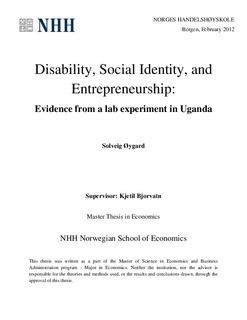Disability, social identity, and entrepreneurship : evidence from a lab experiment in Uganda
Master thesis
Permanent lenke
http://hdl.handle.net/11250/169409Utgivelsesdato
2012Metadata
Vis full innførselSamlinger
Sammendrag
There are more than one billion persons with disabilities worldwide, constituting one of the most marginalized groups in the world. This paper investigates barriers to entrepreneurship among persons with disabilities. The focus is on psychological barriers like prejudice and lack of self-confidence, which are influenced by social identities. The analysis is based on a lab experiment carried out in Kampala, Uganda, in which the participants were youths in the final years of education, and thus on the doorstep to the market for employment. Given the lack of jobs, starting a business is often the most likely prospect. The social identity of persons with disabilities is studied through the use of priming, i.e. making a particular social identity salient. The main finding is that priming increases the confidence of persons with disabilities. Thus, there is an empowerment effect of making the social identity of persons with disabilities salient, contrary to the expectations. This is probably due to a selection effect as the participants have a relatively high level of education; the participants with disabilities are probably more empowered than the typical young person with disabilities in Uganda. Nevertheless, people generally believe that persons with disabilities perform worse than people without disabilities, although they actually perform equally well. The results suggest that prejudice is a key barrier to entrepreneurship among persons with disabilities
